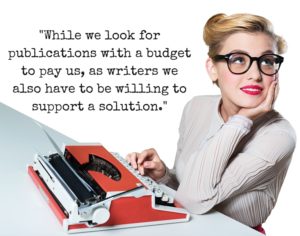 By Bonnie Jean Feldkamp
By Bonnie Jean FeldkampFor those who’d prefer to listen to this article you can do so at this SoundCloud page HERE.
Many in the industry have discussed both sides of this issue. Some refuse to write for free and ask others to do the same in hopes that they’ll enact change in a bottom up approach. Others play the odds the right person will read their work if it’s out there and hope getting paid-in-exposure will lead to a lucrative book deal or at least a regular gig at a publication. Still others fall somewhere in between – writing for free on a selective basis when they think it’s worth it. Jennifer Niesslein, editor of the online literary publication Full Grown People writes about this in detail for Creative Nonfiction Magazine and if you haven’t read it yet, I suggest you do. Find it online
There’s a fundamental problem in the discussion about not getting paid to write. We complain about how it affects us, instead of looking at the root cause. We’re concerned about the cough instead of the virus, so to speak. No one is talking about how to make it better. We just say, “pay me, I’m worth it,” and we totally are.
On the flip side of things, in the world of Internet reading and sharing, everyone expects to read for free. Think about it, when is the last time you paid for an article? A magazine? A newspaper? Any content whatsoever? (You book writers aren’t off the hook either. Gina Barreca talks about your responsibility to the indie book stores HERE.)
We’ve watched newspapers dwindle and die for years knowing the end was near. They’ve tried online subscriptions, even offered so many articles for free, but no luck. That’s when the industry learned that there are two types of reading, “lean in” reading (online spontaneous discovery reading) and “lean back” reading (sit in a comfy chair with a chosen book reading). Journalists lost their jobs and papers closed their doors. Writers flooded the market. Now, to find solid journalism is difficult because, as consumers, we expect quality journalism for free. The quality has tanked in some regards. Typos are everywhere because many columns are never seen by a second set of eyes prior to being published. Click bait ads make it so difficult to maneuver information that the reader abandons the article all together. Instead of seeing your own frustration as a consumer, try and see the industry that is struggling, searching for its new path.
Facebook likes and shares are the new drug of choice for many writers. Boosting posts and collecting “likes” is another hope for impressing an editor who can only afford to to pay you in “exposure.” They hate the game too. There are a few big online publishers who take advantage of the writer (Huffington Post) but many editors are equally frustrated with the current state of the industry. They wish for a budget to pay for quality as well. They are also underpaid.
While we look for publications with a budget to pay us, as writers we also have to be willing to support a solution. I encourage each of you to pick a publication that you enjoy on a regular basis and pay for a subscription. You can afford the $25. Yes. You can. Or if an online magazine you like prints an anthology – buy it. Become a member of an organization that supports the craft, like this one. This may not be the final solution for the industry, but it’s the only solution the industry has right now. We’ll figure it out. The music industry is starting to, and they hit their tech crisis before the publishing industry.
We really can’t complain about not getting paid to write until we’re willing to pay for the quality content we wish to read. Quality still exists. Be willing to support it. So, what publication are you spending your $25 on today?
* * *
Communications Director
Bonnie Jean Feldkamp’s work has appeared inThe New York Times; Brain, Child Magazine; Scary Mommy and regional parenting publications across North America. Find her at her accounts on FaceBook, Twitter or Instagram.

